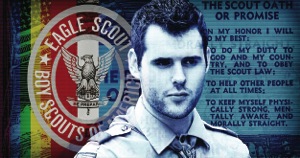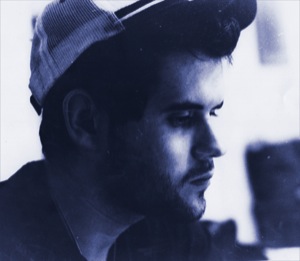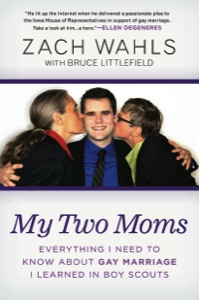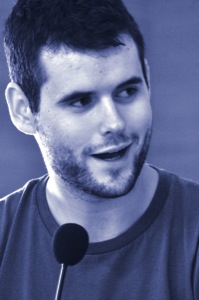
“I’m not an activist. I’m just a kid from Iowa who happened to be in the right place at the right time to make the kind of argument that folks who are on the fence need to hear.”
— Zach Wahls
Zach Wahls, the author of My Two Moms, a former Eagle Scout and founder of Scouts for Equality, will speak at the Unitarian Universalist Church in Hillcrest Sunday. San Diego-based Advancing Compassion Project says that the organization has helped bring Wahls to San Diegans for far lower suggested donations than the $100-plus fundraisers often fetch for in-demand speakers, such as Wahls. The suggested donation for the event is $5 for students; $15 for adults at the door, and $10 advance-purchase adult tickets, available at advancingcompassion.org/shop/. There will also be a book signing event, with a suggested donation of $25 to support the launch of Scouts for Equality.
Wahls is the straight 21-year-old son of Iowa couple Terry Wahls and Jackie Reger. His impassioned, markedly concise and often-hailed as “very compelling” speech to the Iowa House of Representatives Judiciary Committee about growing up as the child of same-sex parents failed to persuade the Republican-dominated House to vote in favor of marriage equality. But it garnered 18 million views on YouTube – and made Wahls a household name.
Wahls took time out of his doubtlessly hectic schedule to answer a few questions from San Diego LGBT Weekly in advance of his Sunday appearance here in San Diego.
San Diego LGBT Weekly: When did you first experience discrimination based on your parents orientation; what happened and how did it feel?
Zach Wahls: It’s important to separate “discrimination” from “stigmatization” as they’re totally separate, but are often used interchangeably. I wouldn’t say I’ve ever experienced “discrimination,” per se, but the first time I ever felt negative stigma about having same-sex parents, I was in the fourth grade. I remember this girl asking me what my mom and dad did, and she did it in such a way that I instinctively knew that if I answered truthfully (i.e. that I didn’t have a “mom and dad”) that she would be, somehow, disappointed in me. And I didn’t want that. It didn’t feel good. And the weird thing is that it wasn’t her fault, really. It was really this internal thing where I wanted to fit in, and be alike, but – by definition – couldn’t.

Did you have a moment(s) when you wished you just had a mom and a dad raising you (or just one mom)?
Absolutely. The answer above is one example. There would be plenty more over the next five years. I didn’t really start settling in to my own until my freshman year of high school and I wasn’t really confident in who I was until my senior year of high school. That being said, I think it’s important to understand why I felt like that. I didn’t dislike or hate or loath my parents. I disliked the fact that I didn’t fit in. I disliked the fact that I was different. At that age (frankly, at any age) being different is dangerous, and it put a target on my back. That difference is true whether you live in San Francisco, California or Sioux City, Iowa. One of the biggest problems I see in the LGBT community today is an attempt by gay parents to deny the possibility that their kids might be bullied or negatively stigmatized because of who their parents are. It’s natural, I think, and no parent wants to think that they might be creating difficulty for their kids. We simply have to remember that it’s not their fault, not our fault – we can’t blame the victim. We simply have to make sure that we’re preparing kids to deal with that harassment and/or stigmatization when – not if – they experience it.
What happened to make you decide to become a voice for same-sex parented families (when was that)?
I’m not an activist. I had never been to a Pride until the video of my testimony before the Iowa legislature blew up online. I’m just a kid from Iowa who happened to be in the right place at the right time to make the kind of argument that folks who are on the fence need to hear. As I started to hear from people whose minds had been changed because of that video, I started to realize that there was a resonance to my family’s story that I hadn’t understood before. Given where this country is in its “evolution” on LGBT rights, taking some time off of school to advocate in a full-time capacity seemed like the right thing to do.
Would you tell our readers about your tenure as a Scout; and what happened to end it?
I joined as a Tiger Scout in 1997. I achieved the rank of Eagle Scout in 2007, the highest rank the Boy Scouts have to offer. I wasn’t forced out or anything. I simply reached the maximum age and “graduated,” so to speak, from the program.
Are there reasons scouting should be a part of a child’s life (what are they)?

There are a multitude of reasons the Scouts should be a part of any young man’s life. They reaffirmed many, many of the values I learned from my moms. They gave me opportunities to learn new skills, to spend time outdoors and to make new friends. In fact, the Boy Scouts was one of the few places where I felt 100 percent comfortable about having lesbian parents. At the time, everybody knew, so I had nothing to hide, and even if I had, I wouldn’t have needed to, because they were all close friends who had zero interest in judging me. I continue to recommend the program in the strongest possible way to all, including those who are gay and to the sons of gay couples.
What message does the Boy Scouts of America send to young scouts by banning LGBT people?
It’s not just a message to young scouts. It’s a message to their parents, to the community at-large, to the rest of the country and, frankly, the world. It’s a message of internal disarray, an inconsistency with its own principles and their own inability to evolve, as the rest of us have and continue to do, in our understanding of humanity. And unfortunately, it’s drowning out all of the positive messages that the BSA has to share.
What message do you believe should replace that of discrimination in scouting?
I don’t think there’s a message that should replace it. I think it just needs to end. There are many other messages from the BSA about religious inclusivity, mutual respect, treating others how we want to be treated, self-determination, etc. that are already out there, but, because of this message, are being drowned out. The Scouts aren’t about discrimination. What we’re hearing and seeing isn’t about discrimination. I’m not even sure it should be described as a “message of discrimination,” because more than anything else, it’s a message of fear. That’s why it’s so disappointing: a Scout is supposed to be brave.
Why do you think it’s been harder for the Boy Scouts to overcome homophobia vs. the Girl Scouts?
It’s been harder for the BSA to get over this than the GSA for the same reason that men are less likely to support LGBTQ rights than women. A lot of homophobia – and I mean that literally, not in a “hateful” or “bigoted” sense – is rooted, fundamentally, in sexism. This is why gay men continue to be stigmatized in a way that’s worse, or at least less socially acceptable, than what gay women often experience, relative to straight women. It’s absurd to me that, in 2012, we’re still dealing with this stuff, but that’s, unfortunately, where we are.

What is the most surprising thing people find out about you and your life growing up as a child of a lesbian couple?
Frankly, the most surprising thing people often find is that I’m a masculine, straight guy who loves football, whiskey, girls, video games, buffalo wings and rap. Again, this is old news to most of us, but some people just can’t wrap their minds around the possibility that lesbian women – somehow – raised a straight, masculine man. And, to be clear, I’m not the pinnacle of masculinity. I enjoy cooking, don’t mind doing my laundry, and have been in more than one drag show, but, frankly, that’s kind of the point. I’m comfortable enough in my masculinity that “breaching” it occasionally doesn’t bother me at all.
What would you like to add?
If any of your readers are current or former Scouts or Scout Leaders, I’d encourage them to check out the organization I’ve co-founded – Scouts for Equality – at our Web site, scoutsforequality.com












Here’s our brand new interview with Zach , talking about the current status LGBT rights, the upcoming election, and his work with Scouts for Equality.
http://www.youtube.com/watch?v=bq4cvvx1hAA